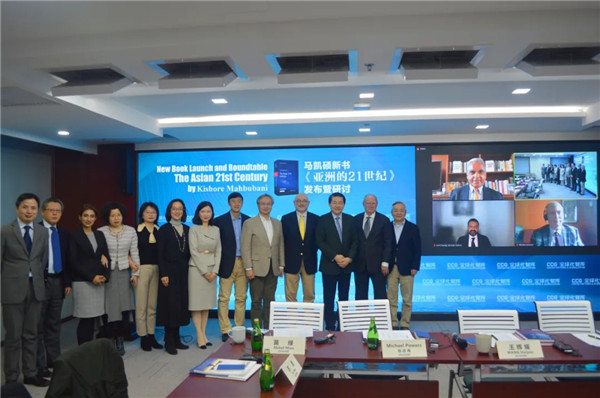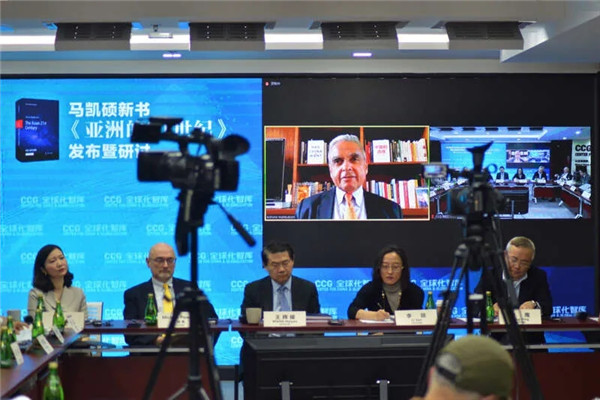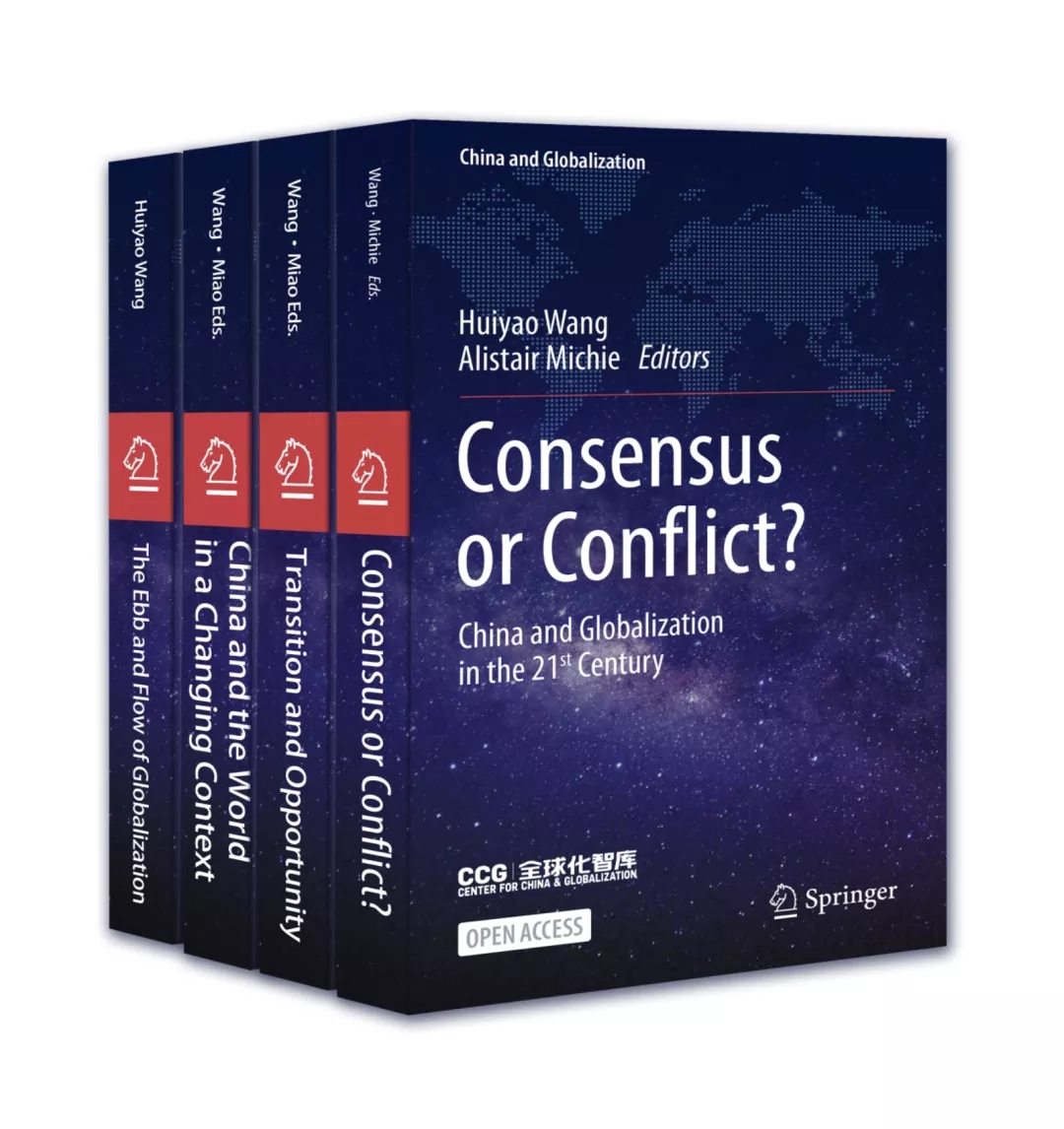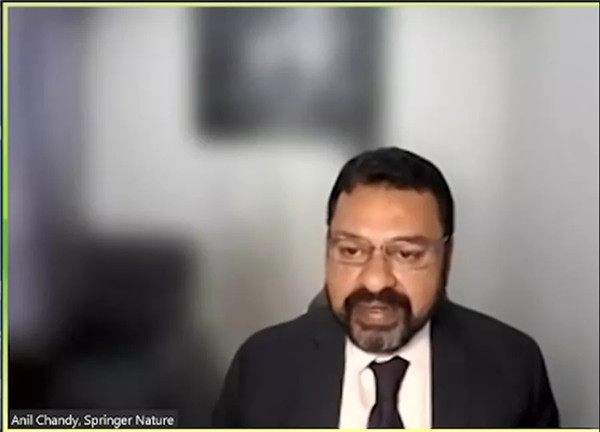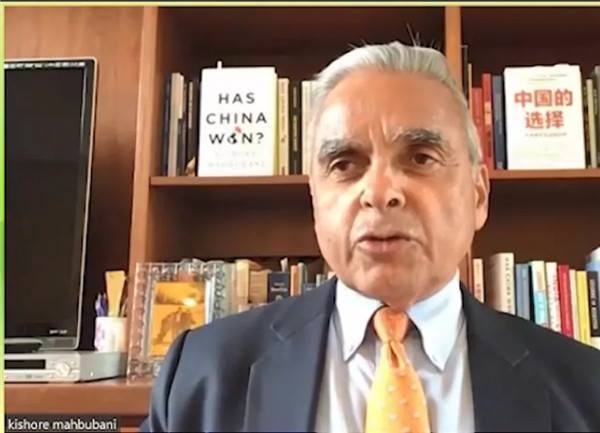Will Asia become the new engine of globalization?—Singaporean author Kishore Mahbubani’s new book “Asian 21st Century” launched
January 11 , 2022
[English]
【Chinese】

The Asian 21st Century
Author: Kishore Mahbubani
Published in January, 2022
ISBN: 978-981-16-6813-5
Publisher: Springer Nature Publishing Group
The new book The Asian 21st Century consists of essays written by Kishore Mahbubani that explore the challenges and dilemmas faced by the West and Asia in an increasingly interdependent “global village” beset by intensifying geopolitical competition. It is an open access book published online on January 1, 2022, which has been downloaded over 11,000 times with 10 days.
On Tuesday, January 11, 2022, the Center for China and Globalization (CCG) and Springer Nature co-hosted a seminar featuring the release of The Asian 21st Century and a roundtable discussion among senior academic experts on regional issues and developments. This book is also a part of CCG’s “China and Globalization” series with Spring Nature. During the launch, senior scholars from the US, Singapore, and China in the field of international relations and from relevant research institutions, as well as Springer Nature’s senior management, discussed future global trends.
Series Editors: Huiyao Wang Lu Miao
Publisher: Springer Nature Publishing Group
Wang Huiyao, president of the Center for China and Globalization (CCG), said in his opening that The Asian 21st Century is the second book in the “China and Globalization” series, which has been conceived in partnership with Springer Nature. The book series seeks to create a balanced global perspective by gathering the views of highly influential policy scholars, practitioners, and opinion leaders from China and around the world. This book series is edited by Wang Huiyao and Mabel Miao Lu, the co-founder of CCG. The motivation for creating this book series draws on the spirit and core culture of CCG. Wang said, “We believe that a globalized world is the core component for the creation of a peaceful and sustainable world order that contributes to the mutual benefit of all mankind.”
Anil Chandy, Springer Nature Singapore Managing Director, explained to the audience the significance of this book, hoping it can guide and inspire us to find Asia’s potential and new role in globalization in the 21st Century. He noted that Mahbubani poses a question that would shape the world as it evolves in the 21st Century. Chandy also noted the broad scope of the book, which covers a range of topics, from American missions, alleged exceptionalism, and regional order to Chinese thought, India, Japan, climate change, and the pandemic. The book grapples with every big question of our times and suggests answers to those challenges.
William Achauer, Springer Nature Group, Business, Editorial Director for Economics, Political Science and Law said that The Asian 21st Century presents a 360-degree view of the current state of international relations. In several essays, Mahbubani analyzes a variety of aspects about the end of Western global domination, followed by a selection of chapters dedicated to the Asian rebirth, with insightful contributions on ASEAN and India. This is followed by a section on the peaceful rise of China, and then the last part of the book looks at globalization, multilateralism, and cooperation.
During the discussion, Mahbubani shared his thoughts on the inevitability of the rise of Asia, the peaceful rise of China, and India’s significance within Asian geopolitics. Mahbubani noted that international rules and globalization were shaped and dominated by the western world in the past 200 years. However, increasingly, our international rules now are initiated by Asia.
The author, Prof. Kishore Mahbubani, is currently a Distinguished Fellow at the Asia Research Institute (ARI), National University of Singapore (NUS); former Singapore’s Ambassador to the UN; and Founding Dean of the Lee Kuan Yew School of Public Policy of NUS. He has been described by Foreign Policy as “the muse of the Asian century.”This book mainly talks about how the twenty-first century will see the return of Asia to the center of the world stage, the peaceful rise of China, multilateralism, and cooperation. The book also addresses issues such as COVID-19, climate change, and how states work with each other in our global village. The book consists of four parts, namely the end of the Era of Western domination, the return of Asia, the peaceful rise of China and the challenge of globalization, and finally multilateralism and global cooperation. Further details are given below.
Part One The End of the Era of Western Domination
The major strategic error that the West is now making is to refuse to accept this reality. The West needs to learn how to act strategically in a world where they are no longer the number 1.
Part Two The Return of Asia
From the years 1 to 1820, the largest economies in the world were Asian. After 1820 and the rise of the West, however, great Asian civilizations like China and India were dominated and humiliated. The twenty-first century will see the return of Asia to the center of the world stage.
Part Three The Peaceful Rise of China
The shift in the balance of power to the East has been most pronounced in the rise of China. While this rise has been peaceful, many in the West have responded with considerable concern over the influence China will have on the world order.
Part Four Globalization, Multilateralism and Cooperation
Many of the world’s pressing issues, such as COVID-19 and climate change, are global issues and will require global cooperation to deal with. In short, human beings now live in a global village. States much work with each other, and we need a world order that enables and facilitates cooperation within our global village.
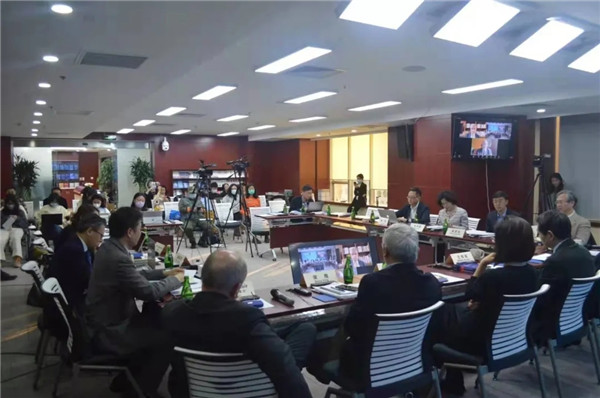 Participants of the roundtable, which tool the theme “The rise of Asia and the reshaping of the world,” were: William Achauer, Springer Nature Group, Business, Editorial Director for Economics, Political Science and Law; David Blair, CCG Vice President and Senior Economist; Anil Chandy, Managing Director of Singapore Springer Nature; Zoon Ahmed Khan, CCG Research Fellow; Michael Powers, Professor of Tsinghua University, School of Economics and Management; Rong Ying, Vice President of China Institute of International Studies (CIIS); Su Hao, CCG nonresident Senior Fellow, Professor and Founding Director of the Center for Strategic and Peace Studies, China foreign affairs University; Shou Huisheng, CCG nonresident Fellow, Research Fellow at the Academy of International and Regional Studies, Beijing Language and Culture University; Teng Jimeng, CCG Nonresident Senior Fellow, Associate Professor at Beijing Foreign Studies University; and Xu Xiujun, CCG nonresident Senior Fellow, Deputy Director of International Political Economy Division at Institute of World Economics and Politics (IWEP), Chinese Academy of Social Sciences (CASS). The discussion was moderated by CCG Secretary-General Mabel Miao.
Participants of the roundtable, which tool the theme “The rise of Asia and the reshaping of the world,” were: William Achauer, Springer Nature Group, Business, Editorial Director for Economics, Political Science and Law; David Blair, CCG Vice President and Senior Economist; Anil Chandy, Managing Director of Singapore Springer Nature; Zoon Ahmed Khan, CCG Research Fellow; Michael Powers, Professor of Tsinghua University, School of Economics and Management; Rong Ying, Vice President of China Institute of International Studies (CIIS); Su Hao, CCG nonresident Senior Fellow, Professor and Founding Director of the Center for Strategic and Peace Studies, China foreign affairs University; Shou Huisheng, CCG nonresident Fellow, Research Fellow at the Academy of International and Regional Studies, Beijing Language and Culture University; Teng Jimeng, CCG Nonresident Senior Fellow, Associate Professor at Beijing Foreign Studies University; and Xu Xiujun, CCG nonresident Senior Fellow, Deputy Director of International Political Economy Division at Institute of World Economics and Politics (IWEP), Chinese Academy of Social Sciences (CASS). The discussion was moderated by CCG Secretary-General Mabel Miao.
Keyword

